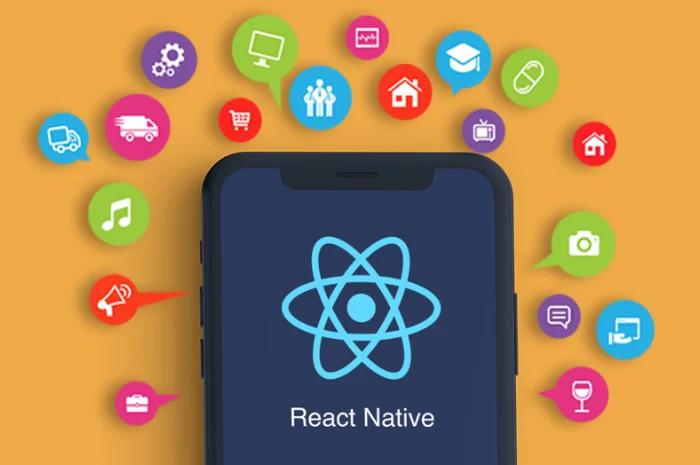Mobile phones have become ubiquitous with almost everyone moving around with a smartphone today. There would be no overstatement in that mobile phones have become an indispensable part of our lives today. When we talk about mobile phones, it is pertinent to discuss the mobile apps as well that have made many things in our lives so easy today. Today, there are just so many apps for almost any purpose, and React Native is the most popular mobile app language for development. These apps are categorized as per their purpose and usage.
Mobile applications have made our lives easier – from communicating with each other through chat apps, socializing with others with social media apps, shopping for apparel, fashion accessories, footwear, furniture, and even grocery with countless e-commerce apps, and much more. It all is possible via a mobile app today and we, practically, see an app for everything. While users love the apps for the level of interactivity and user-friendliness, there is a lot of hard work and effort that goes into the custom application development.
In today’s digital era, users want information in the blink of an eye and most businesses look for a better experience for their mobile app users. There is no dearth of frameworks for mobile application development and React Native is amongst the highly sought-after of these. A lot of businesses are looking for React Native app development services due to the many benefits it offers.
React Native is one of the best mobile app development languages. It is used for building an extensive app for iOS and Android smartphones. There are several resources, tools, and frameworks that are used for building mobile apps. Several tools offer varied functionality for effectively solving the users’ problems. In this blog, we will talk about React Native in detail and that includes a quick introduction to React Native, the benefits of React Native for app development, and how to React Native is used for mobile application development.
A quick introduction to React Native
To introduce, React Native is the best framework that you can use for building your mobile apps using JavaScript. Normally, mobile apps make use of Java while building an Android app whereas Objective-C or Swift for developing applications for iOS.
React Native lets you build mobile applications that work efficiently on iOS as well as Android platforms. Other than this, the time for development is also reduce drastically because coding across all platforms is done in the same language. Facebook launched React Native in 2015. It is an open-source platform for developing mobile apps. ReactJS was launched even before React Native while comparing React Native vs ReactJS, Facebook had introduced ReactJS is an open-source framework. Then, React Native was developed gradually. While ReactJS focuses on mobile-first design, the native apps are developed in React Native.
React Native – importance
When launched initially, React Native was not considered feasible for business use and it wasn’t still able to build native mobile applications. However, with time, React Native improved and today it is amongst the most popular platforms for building native mobile apps and has earned great community support & market share. React Native can be used for creating high-performing mobile apps.
Let’s see what makes React Native so important for businesses and developers today.
- Cross-platform compatibility: While building a mobile app in React Native, apps are built that work well on Android as well as iOS platforms. On compiling the code, it comes down to native Swift and Java code. The basic advantage of using React Native for app development is that you do not need to build two different applications for the two platforms. Furthermore, the features and the layout of the app do not need to be synchronized. This results in considerably lowered development costs.
- Trust: Before launching React Native, Facebook had tested the platform’s viability by building its own mobile app. It helped the developers in creating a stunning app for social media. Today, the Facebook mobile application we use feels just like a native app on the device it is used. Due to being open source, React Native is being used by a lot of other platforms for developing their own mobile apps.
- Easy to code and learn: Now you may wonder if you need to learn another programming language and coding syntax to work with React Native. Let me tell you if you already know JavaScript coding, then you can also do React Native iOS or Android application development.
Learning React Native is easy, especially if you have hands-on experience of coding in React or JavaScript. A developer has to just understand the mobile components that can be integrated with corresponding web components. After completing this, the developer may begin to React Native application development for iOS and Android.
- Faster to develop: Think of a situation when you are using a web app developed in ReactJS. Now you can share the frontend components (developed in ReactJS) among web and mobile interfaces. This helps in faster and easier development.
- Continuous growth: The community of React Native developers, users, and businesses are expanding continuously which means you can get answers to your questions and confusion by reaching out to the experts in the domain.
- Consistency of platform: React Native is compatible across platforms. In general, there’s quite a big difference between the apps developed for Apple and the apps that are developed for Android. When using Reach Native for application development, you don’t need to bother about these differences, thanks to React Native. This is possible due to the shared codebase of the platform. It allows a developer to spend less effort and time in app development for each of these platforms. Furthermore, the same application can work on Apple and Android platforms with the same level of efficiency.
- Huge audience: As React Native-based mobile apps are cross-platform, you may build one application and target a bigger audience. One React Native-based app can work independently on iOS as well as Android platforms. Therefore, you can build React Native Android apps and React Native iOS apps that are completely platform-independent. This ensures that by developing one application, you can easily target both platforms and reach out to a broader and bigger audience.
- Sustainable coding: React Native is a cross-platform mobile app development framework and one codebase can be used for developing apps for iOS as well as Android platforms. In other words, you don’t need to code again and again for different platforms (Android and iOS) if you are using React Native for app development.
If we look at the benefits offered by React Native, it’s not difficult to guess the reasons behind its growing popularity among mobile app developers and businesses alike. While there are other tools also available today for cross-platform mobile application development, React Native still remains the most sought-after among businesses and developers due to the many benefits discussed above. You may hire a mobile app development services provider to build your React Native app and help you expand your market reach with a high-performing, React Native app for your business.
Why should a business choose React Native for mobile app development?
Before you start looking for an iOS or Android app development company, it is beneficial to know a bit more about the amazing reasons that attract modern businesses to think of React Native as their mobile app development framework.
- React Native works under a limited budget as well: Most startups, usually, have limited or low budgets, and money is always a key concern for them. Every small business or startup is interested in achieving a greater and faster return on investment to survive the stiff competition in the current marketplace. They want fast technology that stays longer. For this reason, a lot of startups prefer to hire React Native app development services that help them save their valuable time and, of course, the cost.
- React Native helps build cross-platform apps: With React Native, as we already discussed above, you can build apps for iOS as well as Android with the same code. Therefore, it delivers the same level of performance with no changes required. You can quickly design a mobile app for your business. There is no need for various programming languages such as JAVA, C++, or Swift, or any other language or framework. If you are a JavaScript (JS) developer with rich knowledge of APIs, UI library, and hybrid app development, you can build a React Native mobile application as well.
- Multiple solutions and flexibility under undemanding situations: Depending on your app idea, iOS or Android application development in React Native can help you perform several tasks that are otherwise complex in simple coding. This amazing framework makes use of Facebook’s UI library for making straightforward codes for ReactJS implementation and execution. At its core, React Native application development has a feature called “live to reload” that lets developers operate on real-time code changes and do all the corrections when the app is loading.
- Access to the Native API and focus on UI: React Native developers can make the user interface to look just like it does in JavaScript instead of the framework itself. The goal is to keep the process simple and make the user interface work smoothly to deliver quick and high-end responsive outcomes There is little to no complexity involved in developing a React Native app.
- Primary codebase makes things easy: The foundation-level programming makes use of the same codebase for Android and iOS. It is quite like deploying the same applies to all mobile OS (operating systems). App recompilation becomes easy with no changes in the framework at any level you wish. The entire module is coded in a comparable language for linking it with React Native app developer.
- A web page to mobile app transition is easy: With intuitive code overlays and fragmented modules, React Native is interfaced properly and clearly. In other words, the developers can understand the codes sequence throughout the application and there is no need to have a team of core developers frequently accessing the application. For example, if you are changing your team and looking for outer boundaries, you can adapt to the app development and ensure that the process of app development continues uninterrupted.
- React Native app behaves quite like a native app: For Android and iOS, the code is the same. With a few instructions, it works quite efficiently and reacts faster to conjunctions. React Native’s fundamental units are open to all mobile gadgets’ demands. This way, it performs well under different mobile environments.
Native processors are, generally, CPUs (central processing units) but React Native goes with GPUs (graphic processing units) for mounting its UI. If we compare React Native with other cross-platform app development frameworks, it facilitates developers in developing and executing faster apps thereby increasing the agility of the overall app development process.
- Uses lesser memory in comparison to other platforms: React Native is compatible with third-party plugins and offers smooth runtime. The great framework, along with its diversified modules, makes third-party involvement a lot easier. Without even using the web view, you can connect these modules to the plugins through the native module. The app outcome feature and this phase are connected with each other and deliver a faster response. React Native for Android and iOS platforms use quite less memory space because cross-bridge-linking isn’t needed and most code is used during the runtime.
- React Native has a bright future: If you think that React Native will also eradicate soon, let me tell you this framework is here to stay for many more years and decades to come. Developers simply love the timely-assorted framework and user-friendly manual of React Native. This framework has covered the entire market in very little time. Facebook is also ensuring that React Native stays longer. As days are passing, the platform is getting better and greater by providing solutions to all development, coding, and programming problems. There is no need for the developers to learn another programming language and build highly complex codes anymore with the incredibly easy-to-use React Native.
- Flexible and futuristic approach: With a framework interfaced with iOS as well as Android, you need a single code for removing bugs. While the operations are quite simple and easy, React Native is going to stay in the market for a prolonged period of time. All top heads are making use of this module and, therefore, we can say that it is obviously more responsive and reliable.
React Native mobile app development offers you a platform for keeping the tab on primary spacing and making the app highly efficient. Creating iOS and Android apps using the same code makes things simply great. The big question for any startup or small to mid-sized business owner is that of getting a hold on the app developer. If the developer backs out and leaves your project in the middle for any reason, whatsoever, your project’s heart & soul is lost.
A lot of projects are left in the middle and incomplete state due to the only reason that developers back off. With React Native, however, you don’t need to worry about this at all. React Native has a comprehensive manual that anyone can understand. So, even if your developers back out, your project will not stop and you can ensure that your application is launched on time. It is an excellent solution for businesses looking for outstanding value for money and time. All you need to do is choose to React Native application development and enjoy amazingly easy development and smart, quick responsive techniques for a lifetime.
Now that you know the many reasons and how you can build a mobile app in React Native, let us have a quick look at some of the apps that are based on React Native.
Apps that are built on React Native
Since its launch in 2015, React Native has been widely adopted for building mobile applications that look and feel like native apps. Let us learn about some of the most popular mobile app built using React Native.
- Facebook: Facebook launched it and is the first to use React Native for its mobile app.
- Skype: In 2017, Skype underwent complete redevelopment and redesign from scratch using React Native.
- Instagram: For push notifications integration, Instagram had used React Native into its pre-existing app.
- Walmart: Walmart made use of React Native for designing and developing its app from scratch by re-coding the entire app using React Native.
- UberEats: This is one of the apps that are completely based on React Native right from the beginning. These apps were created by the developers’ teams with no prior experience of working with iOS and Android and they just picked React Native as an obvious choice.
- Pinterest: This amazing app also has React Native as its chosen framework.
Summing up
React Native is unquestionably the most chosen and sought-after mobile app development framework today due to many reasons such as reusable codebase, easy to learn and execute, faster development, huge audience, ever-growing community, cross-platform compatibility, and many more. If you analyze the benefits and significance of React Native, you can easily see how amazingly it can save your time, effort, and money.
If you are ready to make the most of this great framework for your business, consider hiring a trustworthy React Native app development services provider right away.






